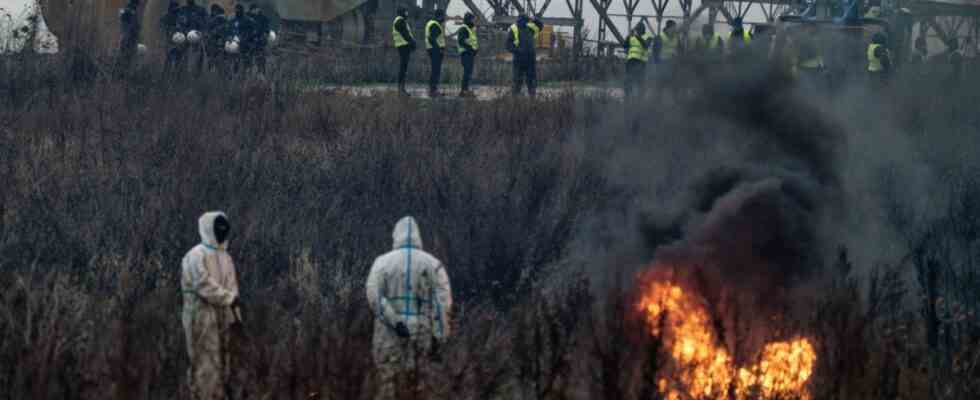Wolfgang Metzeler-Kick was imprisoned for 15 days in November because he stuck himself to the Stachus in Munich and blocked traffic. When he left the prison in Stadelheim, the 48-year-old climate activist from the group “Last Generation” even gave the Bavarian officials in writing that he was going to Lützerath in North Rhine-Westphalia.
Since early Monday morning, Metzeler-Kick’s left hand has been stuck with superglue on the access road in front of the Erkelenz town of Lützerath, about 40 kilometers from Düsseldorf, which has been fought over for years, at the Garzweiler II opencast lignite mine wind rustles. “I can’t just watch as Lützerath is excavated and mankind wipes itself out,” says the engineer for technical environmental protection. “What’s happening here is fossil madness. I can’t accept the fact that it’s legal to kill ourselves.”
Scuffle between police and squatters
Germany will phase out coal-fired power generation by 2038 at the latest in order to comply with the Paris climate agreement, which is intended to limit global warming and slow down the climate crisis. In NRW, the energy company RWE even wants to exit coal production as early as 2030. But the village of Lützerath in the Garzweiler II opencast mine may still be excavated for coal extraction. This is part of a deal between the federal government, the black-green NRW state government and the opencast mine operator RWE. In contrast, climate activists have occupied the six houses in the village for months and built a protest camp with up to 30 tree houses. The land and houses have long belonged to RWE; the former residents were paid off by the company and have moved away. According to RWE, the lignite under Lützerath is needed “to ensure a secure supply of the power plants in the midst of the energy crisis”.
Minutes later, police officers try to break through the climate activists’ barricades – and initially fail. Burning car tires and tar paper, stacked branches and wooden slats as well as brick towers block the way for the emergency services. The activists in white body suits chant “ACAT” (all cops are targets). Some throw stones, bottles and firecrackers at the police officers; a criminal complaint is filed against them. Later there are also scuffles between police and squatters.
Actually, a public action training of the climate activists should take place on Monday morning in Lützerath. There they wanted to practice, among other things, sit-ins on streets and flowing through police chains. Instead, five activists in white body suits stand behind burning car tires and warm their hands. Their exercise was canceled at short notice because RWE began preparations for the evacuation of Lützerath on Monday under police protection.
The eviction should be quicker than that of the Hambach Forest
With heavy equipment, workers drove up to the site from the demolition edge of the opencast mine and leveled paths. In addition to the police, dozens of RWE security employees surrounded the work. The police have announced “that they will clear the barricades that we have built to protect the village,” said Florian Özcan, spokesman for the “Lützerath Lives” initiative. The up to 300 demonstrators who are currently occupying Lützerath would fight back.
It’s getting serious now. The three access roads are largely closed; Lützerath can only be reached on foot or by bike. From January 10th, there will be a ban on entering the site and the surrounding area. The eviction could actually begin the next day. Then the lignite should be dredged under the village. Unlike the clearing of the occupied Hambach Forest between Cologne and Aachen in 2019, which became the largest and, at 50 million euros, the most expensive police operation in the history of North Rhine-Westphalia, Lützerath should be faster.
It’s just after twelve o’clock when Wolfgang Metzeler-Kick removes his taped hand from the street. “She takes over,” he says, pointing to a three-legged wooden frame. Another climate activist is currently pulling herself up several meters to the top of the tripod on a rope; a large bottle of water is sent after her from below. A few meters away, “jerky concrete” is mixed in a plastic tub to anchor barricades in the street tar.
The climate activists in Lützerath do not want to give up without resistance. But in the evening the first barricades on the access road, the wooden entrance gate and a bridge are cleared. And police rescuers from heights got the people out of the tripods.

